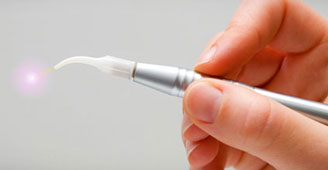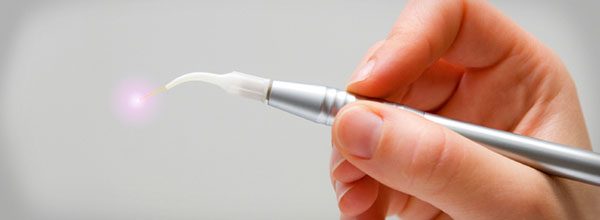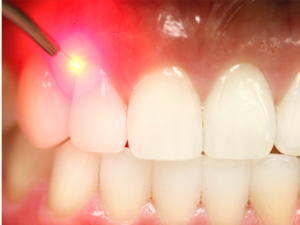
01 Feb FAQs about Laser Dentistry: What You Need to Know
Lasers are an increasingly useful tool in the dentistry field. Not only are they less invasive than more traditional methods but they are also very precise. Below is more about laser dentistry, the laser applications we use at the Dental Wellness Group, and Dr. Moradi’s expertise in this area, all within a question and answer format.
What is Laser Dentistry?
“Laser” stands for Light Amplification by Stimulated Emission of Radiation. Laser dentistry refers to the use of lasers rather than drills, with the focus on using the cutting-edge technology to make your dental visit more comfortable than you thought possible. At the Dental Wellness Group, our team is your trusted go-to provider for routine teeth cleanings and dental fillings to full mouth restoration and cosmetic dentistry procedures.

Are Lasers Used Often in Dentistry?
The growing popularity of laser dentistry is undeniable. More and more dental offices around the world are embracing the use of lasers because they are quick, effective, and reduce anxieties that many people feel at dental visits. Dr. Moradi is proudly one of these laser dentists.
How Do Laser Dentists Use the Technology?
The laser is a focused beam of light; it is this light that provides energy during surgical and dental procedures, so that the laser works as a cutting instrument or melts away tissues, depending on its application. When using the laser to “cure” a filling, a laser dentist applies the beam to help strengthen the bond between the tooth and filling.
The laser in dentistry simultaneously sterilizes and thickens blood vessels, which reduces risks of infection. For the patient’s eye protection, safety glasses are worn by patients at all times.
What are Specific Applications of Laser Dentistry?
Lasers in dentistry have a number of effective uses, including:
- Alleviating Tooth Decay – Lasers remove tooth decay and prepare the tooth’s hard outer coating (enamel) for the filling to come.
- Treating Gum Disease – Lasers treat inflamed gums that if untreated endangers the bone that supports the teeth. Bacteria removal occurs at a deep level, with the laser minimizing bleeding.
- Effective Cosmetic Dental Procedures – Whiten teeth, up to eight shades brighter in only one hour, and reshape gum lines precisely.

Why are the Benefits of Using Lasers in Dentistry?
Enjoy many benefits, including the noise-free laser environment which allows for a more relaxing dental experience every single time than a traditional drill. Also, laser dentistry lessens the need for local anesthesia or sedation as pain decreases in some dental procedures when a laser is used such that anesthesia no longer is necessary.
An additional advantage is that the laser in dentistry can minimize bleeding because the beam of light helps in the clotting of exposed blood vessels, which lessens blood loss. The laser may also control swelling of gums in a gum disease treatment scenario.
Why Choose Dr. Moradi as Your Laser Dentist?
Many doctors incorporate laser dentistry into their practice. Dr. Moradi has been using the state-of-the-art technology for the last decade; she was among the first dentists in Houston to offer laser dentistry. Dr. Moradi holds a certificate from the Academy of Laser Dentistry (ALD).
Is Laser Dentistry Right for You?
The use of the laser instead of the drill can significantly reduce infection, improve healing, and get your out of the dental chair faster than before. Call the Dental Wellness Group today to inquire about laser dentistry and whether it is right for your dental care treatment plan.


